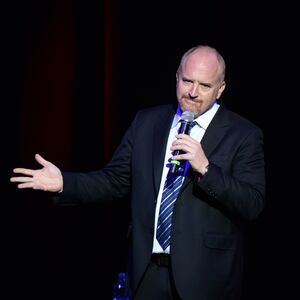Louis C.K. somehow managed to tell my favorite and my least favorite transgender jokes within the span of a year.
In his Netflix special Louis C.K. 2017, the comedian recounts discovering online that his childhood friend had transitioned from male to female. As a transgender woman myself, this would usually be when I start to get a little wary: so many recent hour-long specials from big-name comics contain jokes about my community that would be more hurtful if they weren’t so tired. But what C.K. produces instead is a brilliant bit of comedy that showcases his obvious talents.
After revealing what happened to his friend, C.K. quickly starts using female pronouns for her, informing the audience that he “was crying” as he read her “amazing” blog. But then comes the turn: He feigns anger at the unnamed transgender woman for having once stolen his date at a dance when they were in their early teens, ultimately calling her an “asshole” who “became a cunt.”
In context, the put-down is provocative, sure, but it also feels largely performative—and it’s all the more funny because, although insulting, it also acknowledges the validity of her gender. So many things are happening at once here: C.K. is poking fun at his own hurt feelings without quite letting go of them, all while maligning and affirming a transgender woman in the same breath.
This is exactly the sort of multi-tiered comedy that makes C.K.’s best work such a pleasure to watch. He leads audiences down complex and twisty roads that a lesser comic would be tempted to take into dehumanizing territory—but then he veers to the side and transforms the joke into a revealing, even poignant observation.
“I envy transgender people, though,” C.K. continues. “I do. I know it’s a tough road but I envy them on this level: that they figured out what’s going on with them, and they fixed it. What an amazing gift—to know what the fuck is wrong with you. Who else gets to have that?”
He lands on a tragicomic note, admitting that he would “give a million dollars” to be able to so clearly identify—and correct—his own issues.
As a comedy fan who happens to be transgender, I’m in an awkward spot: Many would accuse me of being humorless for not celebrating my own dehumanization, and yet I’m still here, inhaling stand-up specials and constantly looking for new voices to make me laugh. That year, Louis C.K.’s joke was like a lightning bolt—finally a joke about gender identity that my cisgender friends and I could laugh at together. It was something I could hold up as an example—as proof that comedians can indeed tell jokes about transgender people—even “edgy” ones—without dismissing us altogether.
So it was especially painful to listen to the set that leaked on social media in the final days of 2018. The contrast between these new jokes and last year’s Netflix special is painfully obvious. In his mockery of Parkland survivors, Asian men, and non-binary people, C.K. sounds like the kind of comedian who can’t help but use the stage as a platform for bullying badly disguised as humor.
“They’re like royalty!” C.K. complains, referring to people in their twenties who use gender-neutral pronouns. “They tell you what to call them!”
He then puts on a mocking voice, imitating a caricature of a non-binary person: “You should address me as ‘they/them’ because I identify as gender-neutral.”
“Oh, OK,” C.K. responds. “You should address me as ‘there’ because I identify as a location. And the location is your mother’s cunt.”
What a difference a year makes. It seems clear—as several critics pointed out as the set spread across Twitter—that C.K. has not been taking the “long time to listen” that he promised he would last November when he admitted that the many women who had accused him of sexual misconduct were telling the truth. He’s back, clearly changed by his absence from the stage—and seemingly not for the better.
“My life is over,” he says at one point in the leaked set, as if all hope of redemption were lost—or, at least, too distant for him to want to work toward. “I don’t give a shit.”
That’s not the sound of a gifted performer who wants to one day return to the sort of material he used to do—it’s the sound of a lazy comic who no longer feels the need to aspire to something better than mere name-calling. Like so many of the high-profile comics C.K. used to stand above, he has started doling out low blows and calling them jokes. There was a high road, however narrow, he could have taken—but he didn’t.
And now, my non-binary friends have been thrust back into the national conversation, not for their bravery in challenging a culture that insists they pick one of only two rigid options, but for being easy targets in a cruel Louis C.K. set.
Just last year, the comedian praised people who transition from one gender to another for correcting the things that were causing them pain. Those who come out as non-binary deserve exactly the same respect—and I say that as a transgender person who has had the most boring, stereotypical, “binary” transition ever, with hormones and surgery and the whole works. Non-binary people are also trying to live more authentically, just as Louis C.K.’s old acquaintance was when she transitioned.
So the fact that Louis C.K. respected a transgender woman in 2017 and then dissed virtually all non-binary people in 2018 is more than a little puzzling. Whiplashed, I have several burning questions after listening to that leaked audio: Has the comedian had a change of heart and made a rightward turn as many have speculated? Was his past acknowledgment of the validity of transgender identity just an act—something he felt compelled to perform to remain in the good graces of an audience who had come to expect something nuanced and humane from him—or was it something he truly felt?
And if the latter, why would Louis C.K.—who grew up in the age of androgyny, David Bowie, and gender revolution—suddenly draw a line at non-binary people, becoming in the process the most wince-inducing genre of comedian: the middle-aged performer whose entire routine can be boiled down to “kids these days?”
Ultimately, I’m left mulling over my favorite transgender joke, uncertain what to make of it now. At the time, like all the best comedy does, it seemed to tell the truth. Now I’m not so sure it wasn’t an artful lie.








